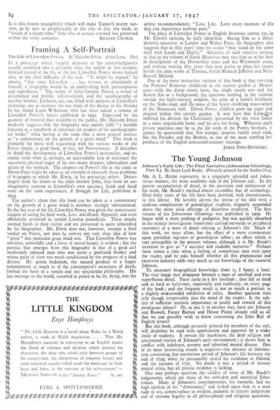A Pledge for Posterity
Tins volume of poems appears posthumously, and therefore the appropriate task of the critic is not to analyse it, but rather to survey the whole field of the man's work, of which these new poems are both crown and representative. Turner was a genius rather than a talented artist. As a craftsman I have always found him capricious, and much at the mercy of wilful ideas, so that poetry of the purest water, some of the most original in our language, is to be found juxtaposed to wild statements and often comic associa- tions of ideas. Examples will be found in this book, a large collec- tion of his work written during the last ten years since the publica- tion of his Selected Poems by the Oxford Press. To have known him personally will put the reader in the position of being able to discount those quaint flaws in his work. Readers of later genera- tions, coming to what Turner has called these "fossils of a future time," will be baffled, often astonished, but, it may be, also intrigued by so strange a display of character and idiosyncrasy. They will not be able to make up their minds what these marks and flaws ita the "fossils" signify ; whether they were put there deliberately, or with the unconscious obstinacy of the oyster as it creates:a pearl. Possibly Turner's idiosyncrasy may add to the value of his poems in the future, when the contemporary association of ideas and images, which makes them disconcerting for us, has subsided into
time. •
Let us wait that verdict on this odd element in Turner's work which all his readers know, and art willing to accept. The thing to do now is to consider the poetic riches in this last volume:. They are abundant ; tossed "there as carelessly as a child tosses shining pebbles about by the sea. There has always been something of the child in Turner ; a lovely wilfulness, a total unself-conscious- ness' an extravagance of gesture. That child plays a large part in the making of Turner's poetry, and will therefore be an immortal child. It contributes all the ecstasy, the surprise, the naive rapture, which distinguish his work and give it the innocence that makes it unique.
This new volume abounds in examples, poems that show him leaping into that solitude of spirit where a child always runs, seek- ing a freedom that to an adult seems impossible, were it not proved - to him there as he watches the child. Turner is always leaving the herd of mature humanity in that way.
"Who knows the look of lave • Never needs-science to prove That Time and Space are but Dreams we remember not,
"I shall remember none • When this bright world is done, Long ago I did fly Beyond this earth and sky.
"Deep in that atmosphere So far, so close to here Without a touch or kiss I reached eternal bliss."
That "eternal bliss" was always with him. It was a possession he shared, perhaps, with William Blake. It saturated all his visipn, so that even his petty moments, set down in verse with an absurd solemnity, were touched by its light. And when it was allowed to shine unobscured by the bric-k-brac of his wilfulness and his passing interests, it opened out into scenes that must attract readers permanently, because of their elusive and ineffable beauty. Few poets have had such a revelation. It is as though Turner found a substance, or half-substance (in the Spinozan sense), for the . -
universal paradox of beauty.
"This multitudinous music of men's lives Hear then, and marvel at such bright-shaped songs— Harmonious men and women carved in love, Whose forms surpass the mountains and the clouds Yet bearing secret themes, serpent and dove,. Ambiguously twining strange melodic smiles Out of vast depths where not a sound belongs." It is this frozen intangibility which will make Turner's poetry sur- vive, as he says so prophetically in the title of this last book, as "fossils of a future time," little rifts of ecstasy crushed but preserved



































 Previous page
Previous page